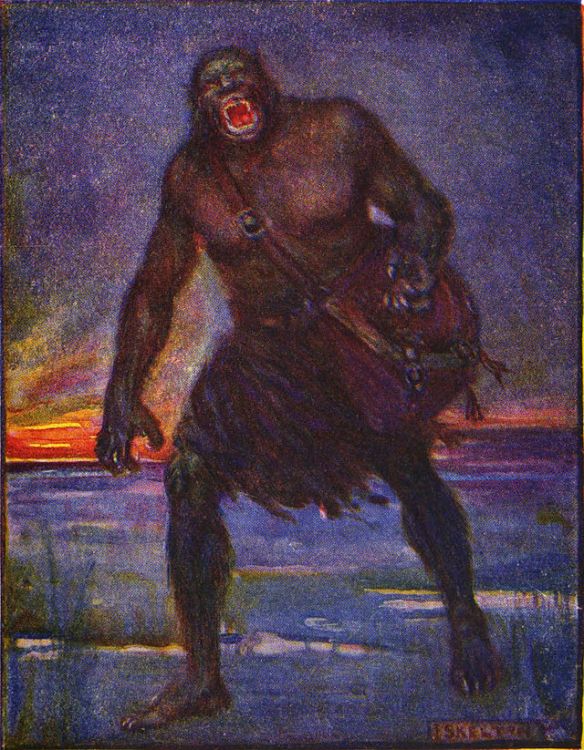Synopsis
Translation
Recordings
Is Beowulf’s Magic Armour really just God’s Influence?
Celebrating A Well-Armoured Warrior
Closing
Back To Top
Synopsis
Grendel’s mother gets Beowulf down, but he bounces back.
Back To Top
Translation
“She was quickly up and payed back that blow
with a fierce grip of her own, followed through with her forward grasp.
Stumbled then the wearied warrior, though the strongest,
a true foot-soldier, so that he fell to the floor.
She sat then on her hall-guest and she drew a dagger,
broad of blade, bright of edge; she was ready to avenge her son,
her only offspring. But on his breast lay
the firm mail-coat, that protected his life,
it prevented the dagger’s point and its edge from piercing.
The son of Ecgþeow would have perished
beneath the wide earth, that Geatish man,
if his war-corslet had not provided its help,
that tough mail-coat, and holy God
controlled the victory in that battle, the wise Lord,
Ruler of Heaven, he easily decided
the right outcome for the fight, once that man stood up.”
(Beowulf ll.1541-1556)
Back To Top
Recordings
Old English:
{Forthcoming}
Modern English:
{Forthcoming}
Back To Top
Is Beowulf’s Magic Armour really just God’s Influence?
Beowulf’s back, baby! Just as with the fight against Grendel, there’s explicit mention of god’s favour at the end of this passage. Though, Grendel’s mother almost had him.
Sitting astride her victim, she had a dagger at the ready, and raised. She would’ve gotten away with it, too, if it hadn’t been for that meddling mail!
In fact, Bewoulf’s mail coat gets top billing, while god is just mentioned after the fact.
I think that the poet credits the armour and then god because the mail’s turning away the dagger is the incident, while god is said to be the cause.
Though, I can’t help but think that Beowulf’s armour is more than just something he straps on before a fight. I mean, he always heaps it with importance. In fact, he goes so far as to say that if he dies, the Danes need to send his armour back to Hygelac before the fight with Grendel (ll.452-453). As far as heirlooms go, that mail’s definitely really important to him. And he makes it clear that it’s the work of Weland the Smith (l.455), so there’s some magic to it.
And thinking of magic armour brings my mind around to RPGs.
As an avid fan of RPGs I find Beowulf interesting from a character building perspective. If you think of Beowulf as a caharacter in a game of Dungeons & Dragons (D&D) or in an RPG on a video game console or PC, then his attack stat is insanely high (that handgrip’s something to reckon with, right?), but his defense most be average or worse. So to compensate he’s got this magic mail.
Looking at Beowulf this way really makes me wonder if the poet or the audience for the poem had some sense of fighters being offensive or defensive but never both, and the magic mail is a device that makes Beowulf almost invulnerable since it balances his defense with his attack power.
Though, on one hand I feel like reading eowulf as a character from an RPG like this is reading things from my life into Beowulf rather than reading things actually in the poem out of it. On the other hand, though, complex games like D&D aren’t outside the ken of people from the medieval period. Surely somebody, somewhere in medieval Europe, invented a variation on chess, or had some sort of battle simulation game that had numbers at work behind the clashes of fighters.
Anyway, getting back to the mention of god that I made above, the poet doesn’t just refer to god once in this passage. He lays down three back to back. These three epithets over the course of just two lines suggest to me that something’s up there. However, I can only guess at what exactly is up here. Maybe the poet’s trying to throw attention off of Beowulf’s magical armour – surely a heathen idea! Or maybe he’s just playing up the Christian spin on wyrd to show that magic armour or not, it isn’t the gear that a player has equipped so much as it is the DM’s rolls that save people.
Chess has been around in Europe since about 800 AD, so the poet and audience of Beowulf likely knew about it, and maybe some of them played it. How complex do you think medieval board games were? Did thanes sit around playing dice and checkers while enjoying their mead and pork, or were some of them playing games as complex as D&D?
Back To Top
Celebrating A Well-Armoured Warrior
The “werig-mod”1 “feþe-cempa”2 could make a fantastic “sele-gyst.”3 Especially after he has dirtied his “breost-net”4 on the battlefield (is that rust or blood…or both?) and achieved “wig-sigor”5. Though that “heaðu-byrne”6 may have just narrowly turned the sword “brun-ecg”7 away from his vitals in the fight. But at least that means that there aren’t any holes in him, or that wondrous “breost-net”4!
1werig-mod: weary, cast down. werig (weary, tired, exhausted, miserable, sad, unfortunate) + mod (heart,mind,spirit,mood,temper;arrogance, pride,power;power, violence)
2feþe-cempa: foot soldier. feþe (power of locomotion, walking, gait, pace) + cempa (warrior, champion) [A word exclusive to Beowulf]
3sele-gyst: hall-guest. sele (hall, house, dwelling, prison) + gyst (guest, stranger) [A word exclusive to Beowulf]
4breost-net: coat of mail. breost (breast, bosom, stomach, womb, mind, thought, disposition) + net (netting, network, spider’s web)
5wig-sigor: victory in a battle. wig (strife, contest, war, battle, valour, military force, army) + sigor (victory, triumph)
6heaðu-byrne: war-corslet. heaðu (war) + byrne (corslet)
7brun-ecg: with gleaming blade. brun (brown, dark, dusky, having metallic lustre, shining) + ecg (edge, point, weapon, sword, battle-axe)
Back To Top
Closing
Next week, Beowulf’s luck turns around.
You can find the next part of Beowulf here.

